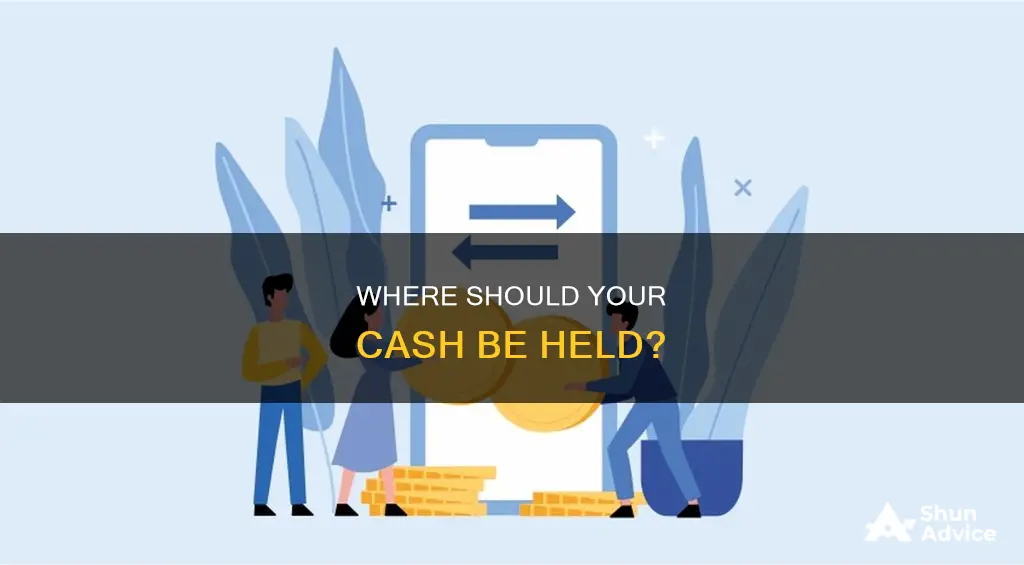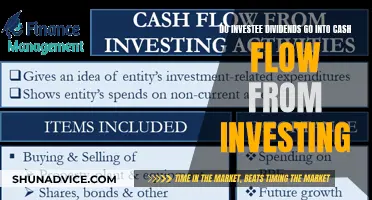
Deciding where to hold your cash depends on your goals, time frame, attitude, and needs. If you're wary of banks and the stock market, there are several alternatives to consider.
If you're saving for the short term, a savings account is a good option as it offers flexibility and insurance from the Federal Deposit Insurance Corporation (FDIC). You can access your savings whenever you need or want to, and the government will insure you against losing your money if the bank fails.
Money market funds are another option. They are mutual funds that invest in short-term debt securities with low credit risk. They can offer higher yields than a savings account, but they're not insured by the FDIC, and you could lose money investing in one.
Certificates of deposit (CDs) are time-deposit accounts issued by banks, offering a fixed rate of return in exchange for locking away your funds for a set period. CDs may be appropriate if you have a long time horizon or know you won't need the money immediately.
For long-term savings, consider US government bonds, real estate investments, precious metals, or even keeping cash hidden away.
| Characteristics | Values |
|---|---|
| Accessibility | Easy access to cash for everyday use or long-term investment |
| Insurance | FDIC insurance covers up to $250,000 per depositor, per bank, per account ownership category |
| Yield | Interest rates are higher than they've been in decades |
| Liquidity | Liquidity is important to ensure easy access to cash when needed |
| Flexibility | Flexibility allows for cash to be used for various purposes, such as bill payments or investments |
| Safety | Safety measures like SIPC insurance and FDIC protection safeguard against losses |
| Sensitivity to rate cuts | Interest rate cuts can impact yields on cash products, with some being more sensitive than others |
| Costs | Some options have associated fees, such as early withdrawal penalties or transaction costs |
| Investment goals | Consider your investment goals and time horizon when deciding where to hold your cash |
| Risk tolerance | Assess your risk tolerance to determine if you prefer safer options like savings accounts or riskier investments like stocks |
What You'll Learn

Savings accounts
It's important to consider the interest rates offered by different banks for their savings accounts, as these can vary. Additionally, some savings accounts may have monthly withdrawal limitations, so it's essential to review the account features and requirements before opening an account.
If you're looking for a place to keep your cash that offers both ease of access and insurance, a savings account could be a suitable option. However, it's always a good idea to compare different accounts and financial institutions to find the one that best fits your needs.
Understanding Non-Cash Investing and Financing Activities
You may want to see also

Money market funds
There are four main types of money market funds, each investing in different kinds of securities in addition to holding cash and cash equivalents:
- Government MMFs invest at least 99.5% of their assets in cash, government securities, or repurchase agreements that are collateralized by government securities.
- Short-term credit (Prime) MMFs can invest in government securities and securities issued by banks, corporations, and other non-government entities.
- Municipal MMFs buy municipal bonds and other debt securities, offering potential tax benefits to investors as earnings are typically exempt from federal and sometimes state income tax.
- Standard MMFs are designed with a minimum investment horizon of three months and offer the opportunity for higher yields by holding less liquidity and slightly lower credit quality.
Transferring Cash to Invest on Stash: A Step-by-Step Guide
You may want to see also

Certificates of deposit
CDs come in a variety of terms, from 3-, 6-, or 12-months to 4-, 5-, and even 10-year terms. They are generally considered to be one of the safest savings options. CDs are a safer and more conservative investment than stocks and bonds, but they offer a lower opportunity for growth.
When you shop around for CDs, consider these factors:
- Interest rate: Most CD interest rates are fixed, though there are variable-rate CDs that could earn a higher return if rates rise.
- Term: This is the length of time that you agree to leave your funds deposited to avoid any penalty. The term ends on the maturity date, when your CD has fully matured and you can withdraw your funds penalty-free.
- Principal: With the exception of some specialty CDs, this is the amount that you agree to deposit when you open the CD.
- Financial institution: The bank or credit union where you open your CD will set factors such as early withdrawal penalties (EWPs) and whether your CD will default to being automatically reinvested at maturity.
CDs are insured by the Federal Deposit Insurance Corporation (FDIC) against the loss of your money up to $250,000 per depositor, per FDIC-insured bank. The FDIC considers any other deposits you may have with an issuing bank. If you are holding more than $250,000 in deposits, you can spread your funds across multiple institutions for full coverage.
CDs can be a good idea if you have cash that you don't need now but will want within a few years. They may also be a good option if you want some of your savings invested conservatively, as they can help you achieve lower risk and volatility than investing in the stock and bond markets.
One of the downsides of CDs is that your money is locked into the investment. However, this can be a benefit for savers who worry that they will be tempted to withdraw from their savings. The fixed term of a CD and the penalty for early withdrawal provide a deterrent to spending.
Understanding Cash Equivalents in Your Investment Portfolio
You may want to see also

Checking accounts
- High-yield savings accounts: For money that you want to save for future use or emergencies, put it into a high-yield savings account where it can earn a higher interest rate than it would in a checking account. Look for accounts that offer an above-average annual percentage yield (APY) to all customers, are FDIC-insured, have low or no minimum balance requirements, and charge no monthly maintenance fees.
- Money market accounts: These accounts are similar to high-yield savings accounts but usually require a higher minimum investment and pay a higher interest rate. They are FDIC-insured and offer check-writing privileges and access to your savings via a debit card.
- Certificates of deposit (CDs): CDs are a type of savings account that offers a fixed rate of return in exchange for locking away your funds for a set period. CDs may be appropriate if you have a long time horizon or know you won't need the money immediately. They are FDIC-insured and typically offer higher yields than individual US Treasury bonds or money market funds. However, if you withdraw the money before the maturity date, you may be charged an early withdrawal penalty.
- Brokerage accounts: Uninvested cash in a brokerage account earns interest and is readily available for investing or managing expenses. Holding cash in a brokerage account is suitable if you plan to spend the money within a few days or want to quickly place a trade. Assets in brokerage accounts are protected by the Securities Investor Protection Corporation (SIPC) for up to $500,000 per investor, with a maximum of $250,000 in cash.
STOs vs. Investing Cash: Unlocking the Power of Security
You may want to see also

Brokerage accounts
There are several types of brokerage accounts, including full-service, discount, robo-advisor, and online brokerage accounts. Each type varies in the level of service and support offered, the fees charged, and the investment options available.
Full-service brokerage accounts are ideal for investors seeking the expertise of a financial advisor. These accounts offer extensive investment advice and other wealth management services but charge higher fees. Discount brokerage accounts, on the other hand, are better suited for cost-conscious investors who prefer to make their own trading and investing decisions.
Robo-advisor accounts are platforms where automated algorithms make investment decisions on behalf of clients without human participation. These accounts are typically low-cost and have low account minimums.
Online brokerage accounts are a good choice for investors who prefer to select their own investments and execute their own trades via a website or mobile app.
When choosing a brokerage account, it's important to consider your investing style, short- and long-term goals, preferred types of investments, and the level of service and support desired. It's also essential to understand the differences between a cash account and a margin account. A cash account allows you to buy investments using the money deposited in the account, while a margin account allows you to borrow additional funds from your broker, with the securities in your account serving as collateral.
To open a brokerage account, you'll need to provide personal information such as your Social Security number, government-issued ID, employment information, and financial data. You'll also need to fund the account before making any investments.
Understanding Cash Investments: What Qualifies as Cash?
You may want to see also







